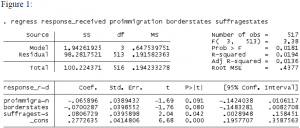Josephine Borich and Dr. Chris Karpowitz, Political Science
Because of changing demographics in the United States, the way legislators respond to minority constituents and to women is becoming more important. My ORCA grant focused on the relationship between constituents who ask immigration related questions to federal and state legislators through letters.
For the first part of my project, I had to collect the data. I collected this data with the supervision of Professors Chris Karpowitz and Jeremy Pope under the Letter to Congress project. In this field experiment, BYU students were put into pairs –one student with a Hispanic sounding name paired with another student with a Caucasian sounding name. Each student selected randomized letters to send to their legislators. However, while the letters varied in type and length, all letter topics concerned immigration. Because the letter topic was about immigration, legislators may have been motivated to respond differently to the students with Hispanic sounding last names.
After we had received a majority of the letter responses from legislators, I began the coding process. There were four independent employees hired to code the letters, eliminating researcher bias. These four coders were BYU students. I trained these coders on the way they were supposed to handle and code the letters. Throughout the entire process, the coders did not know the purpose of the research or the treatment types; my professors and I hoped that the coders would come into this experiment without biases. We also asked that the coders not contact each other when they were coding or talk about the content in the letters. We wanted to make sure that all results were individual, and that the coders were not influencing each other.
The coders would read each letter and then complete a Qualtrics survey. We decided to use Qualtrics as the way to record the coding responses and standardize the procedure for all of the coders. My professors and I came up with a series of questions that we would like the coders to answer. These questions were both objective and subjective. In total, we received 347 responses from legislators out of the 1040 letters that we sent out. Therefore, the response rate was about 33%. The next part of the research process was to create a complete dataset.
I used the statistical program called STATA to export the observations, create variables, and label all of the values. Overall, this process took about 4 months but was essential so that I could analyze the data that I had collected.
After I finished creating the dataset, I analyzed the data using multivariable regressions. A regression shows how different factors such as the race and the gender of a participant affect legislative responses. By showing the relationship between race/gender and responses, I discovered if legislators had biases against constituents.
Here is an example of one of the regressions used and the interpretation of this data (Figure 1). For example, participants are 6.6% less likely to receive a response if they wrote a letter that supported immigration, or supported reforms that made immigration easier. This statistic can be considered accurate about 91 picks out of a hundred. Furthermore, those legislators who are also serving in states that granted women suffrage before the 19th amendment are 8.1% more likely to respond to their constituents. This is an interesting relationship. It seems that states with a history of being progressive and attending to social issues are continuing this trend today on the topic of immigration.

I also found that legislators in general are 61.9% more likely to assume that the constituent is not a U.S. citizen if he or she has a Hispanic last name. In contrast, legislators who have Hispanic heritage are 10.3% less likely to think that a person is not a U.S. citizen, and this happens nearly 100 picks out of a 100. Therefore, Latino legislators are less likely to make negative assumptions about citizenship than their Caucasian counterparts, suggesting that Congress may suffer from a race bias concerning citizenship. I have not presented this regression because of space limitations.
I used many other regressions to analyze the data and will explain the main trends in the results. After controlling for constituents who are Hispanic and/or female, I discovered that legislators do respond differently to Hispanics on immigration related issues. However, females are not treated differently from their male counterparts when asking questions about the same topic. These constituents also have varying levels of satisfaction about the responses they received from legislators. Therefore, legislators sometimes respond differently to constituents. These differences in responses lead to variances in constituent satisfaction.
Hopefully, the research that I have done on this topic can be continued. Yes, sometimes legislators do not treat constituents equally. However, this phenomenon can be changed. The next step of the research should ask why this prejudice exists and propose measures to solve this problem. I am planning to complete this research someday, probably as a graduate student.
